人教版(2019)必修第二册:Unit 4 History and Traditions Reading and Thinking课件(27张ppt)
文档属性
| 名称 | 人教版(2019)必修第二册:Unit 4 History and Traditions Reading and Thinking课件(27张ppt) |
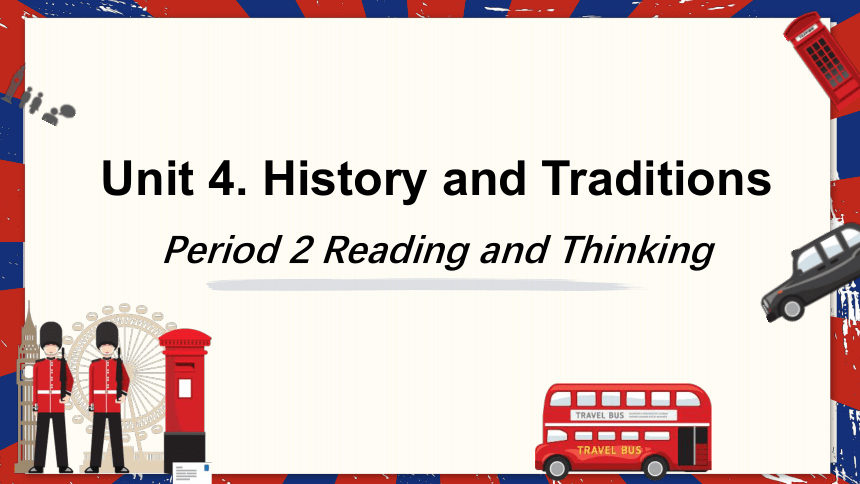
|
|
| 格式 | pptx | ||
| 文件大小 | 15.1MB | ||
| 资源类型 | 教案 | ||
| 版本资源 | 人教版(2019) | ||
| 科目 | 英语 | ||
| 更新时间 | 2022-02-28 00:00:00 | ||
图片预览

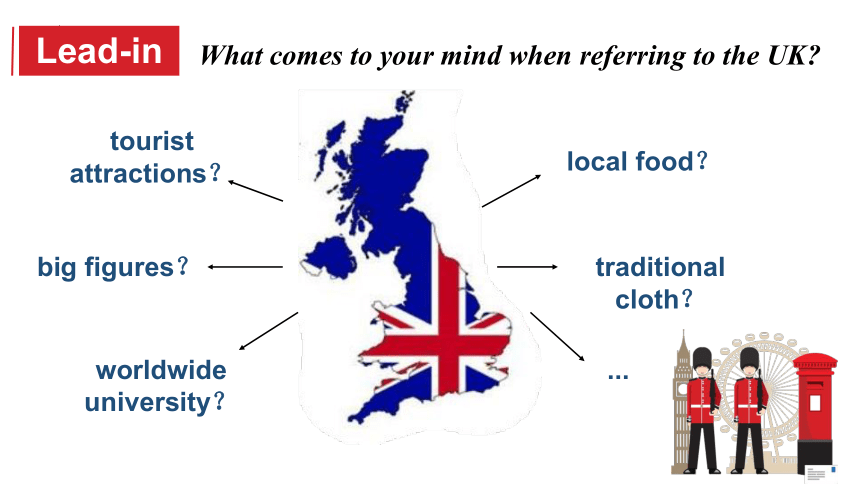



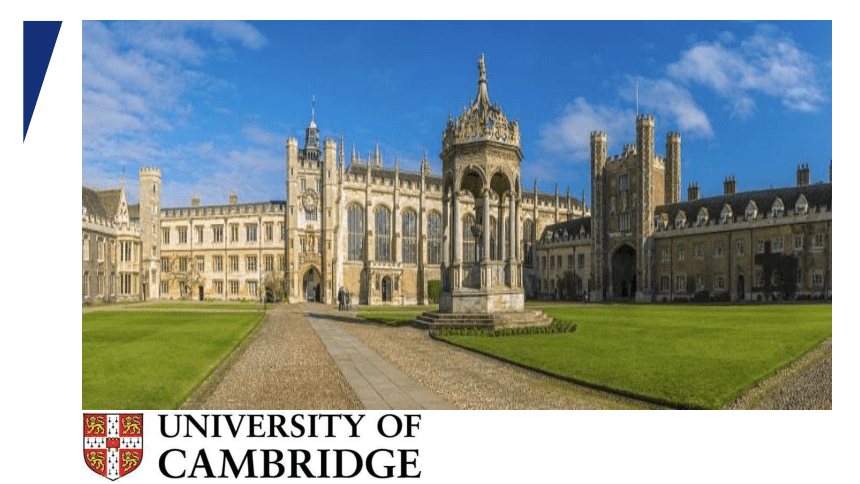

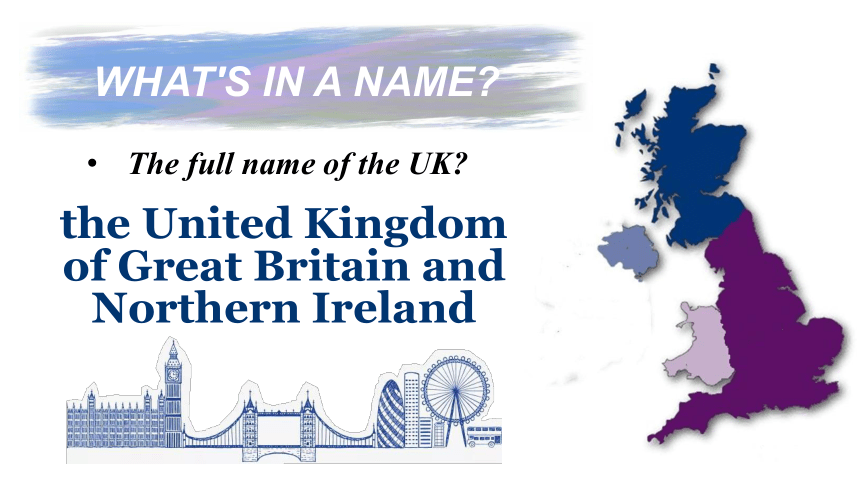
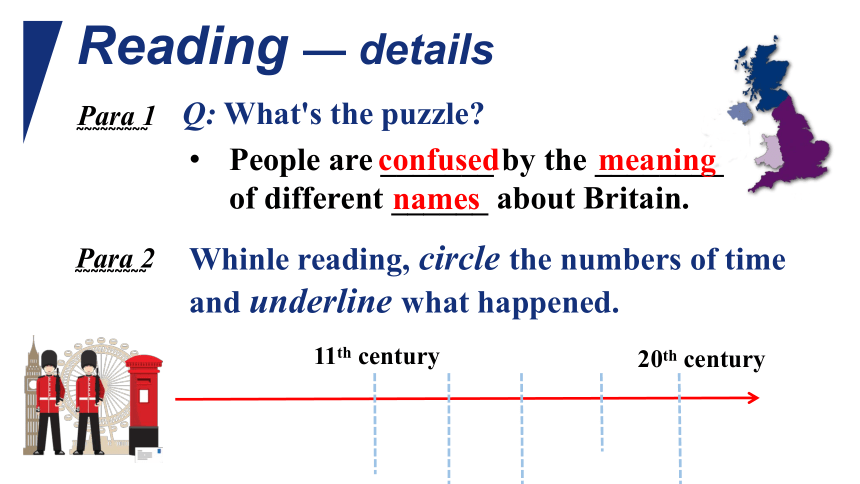
文档简介
(共27张PPT)
Unit 4. History and Traditions
Period 2 Reading and Thinking
What comes to your mind when referring to the UK
Lead-in
big figures?
tourist attractions?
worldwide university?
local food?
traditional cloth?
...
British Royal Family
Prime Minister
Westminster Abbey
Big Ben
the River Thames
Westminster
Bridge
Tourist Attractions
National Gallery
the London Eye
Oxford University
The full name of the UK
the United Kingdom of Great Britain and Northern Ireland
WHAT'S IN A NAME
Reading — details
Para 1
~~~~~~~~~
Q: What's the puzzle
People are _______ by the ________ of different ______ about Britain.
confused
meaning
names
Para 2
~~~~~~~~~
Whinle reading, circle the numbers of time and underline what happened.
11th century
20th century
England
the Kingdom of England
16th century
Wales
Scotland
18th century
the Kingdom of Great Britain
19th century
the United Kingdom of Great Britain and Ireland
Ireland
20th century
Northern Ireland
the United Kingdom of Great Britain and Northern Ireland
=
England
Scotland
Ireland
the UK
Para 3
~~~~~~~~~
Reading — details
Similarities: ____; ________; ______________.
Differences: ________________; ___________;
_________; _____________.
currency
flag
military defence
educational system
legal system
traditions
football teams
Para 4
~~~~~~~~~
Who conquered the UK
What did they leave
new vocabulary
& names of many location
1st century
the Romans
towns & roads
5th century
the Anglo-Saxons
language & the ways people built houses
8th century
the Vikings
11th century
the Normans
castles, changes to the legal system & new words from French
Thinking
Why do we need to study the history of a country
help us understand much more about
the country & traditions (para. 4)
make our visit much more enjoyable (para. 5)
help solve some puzzles. (para. 1)
help to interact with local people
...
Reading
Main idea of each paragraph.
Para. 1
Para. 2
Para. 3
Para. 4
Para. 5
A. Formation of the names
B. Significance of studying
the history of the UK
C. Similarities & differences of
the four countries of the UK
D. Introduction of the topic.
E. Invaders in the history.
Part 1
Part 2
Part 3
(Formation)
VISIT TO THE UK
begin with the capital city - London
A port city with a history dating back to the Roman times
Countless historic sites to explore
Lots of museums with ancient relics
A fascinating mix of history & modern culture, with both new & old traditions
Language Focus & Translation: Para. 1
The United Kingdom, Great Britain, Britain, England—many people are ________(confuse) by _____ these different names mean. So what is the difference between them, if any _______(get) to know a little bit about British history will help you solve this puzzle.
confused
what
Getting
联合王国、大不列颠、英国、英格兰——很多人对这些不同名称的含义感到困惑。如果这些名称有区别的话,那么它们的区别何在?稍微了解一下英国历史,就可以帮助你解开这个谜题。
Language Focus & Translation: Para. 2
In the 16th century, the nearby country of Wales _________ (join) to the Kingdom of England. Later, in the 18th century, the country Scotland was joined to create the Kingdom of Great Britain. In the 19th century, the Kingdom of Ireland was added to create the United Kingdom of Great Britain and Ireland. Finally, in the 20th century, the southern part of Ireland broke away from the UK, ______ resulted in the full name we have today: the United Kingdom of Great Britain and Northern Ireland. Most people just use the _________ (shorten) name: “the United Kingdom” or “the UK”. People from the UK are called “British”, which means the UK is also often referred to as Britain or Great Britain.
was joined
which
shortened
Language Focus & Translation: Para. 3
The four countries ________ (belong) to the United Kingdom work together in some areas. They use the same flag, ______ (know) as the Union Jack, as well as share the same currency and military defence. _________, they also have some differences. For example, England, Wales, Scotland, and Northern Ireland all have different education systems and legal systems. They also have their own traditions, like their own national days and national dishes. And they even have their own football teams for competitions like the World Cup!
belonging
known
However
同属于联合王国的这四个国家在某些领域紧密合作。像拥有相同的货币和国防一样,他们也使用同一面国旗(称为“英国国旗”)。然而,它们之间仍有诸多区别。例如,英格兰、威尔士、苏格兰和北爱尔兰在教育和法律制度上都存在着差异。它们也有各自的传统,比如有自己的国庆节和本国菜肴。它们甚至拥有各自的足球队,参加像“世界杯”之类的赛事!
Language Focus & Translation: Para. 4
The United Kingdom has a long and interesting history _________ (explore), which can help you understand much more about the country and its traditions. Almost everywhere you go in the UK, you will be surrounded by evidence of four different groups of people who took over at different times throughout history. The first group, the Romans, came in the first century. Some of their great achievements included _______ (build) towns and roads. Next, the Anglo-Saxons arrived in the fifth century. They introduced the beginnings of the English language, and changed the way people built houses. The Vikings came in the eighth century, left behind lots of new vocabulary, and also the names of many locations across the UK. The last group were the Normans. They conquered England after the well-known Battle of Hastings in the 11th century. They had castles _____ (build) all around England, and made changes to the legal system. The Normans were French, so many French words slowly entered into the English language.
to explore
building
built
Language Focus & Translation: Para. 5
There is so much more to learn about the interesting history and culture of the United Kingdom. ________ (study) the history of the country will make your visit much more ________ (enjoy). The capital city London is a great place to start, as it is an ancient port city _________ has a history dating all the way back to Roman times. There are ________ (count) historic sites to explore, and lots of museums with ancient relics from all over the UK. The UK is a fascinating mix of history and modern culture, _____ both new and old traditions. If you keep your eyes open, you will be surprised to find that you can see both its past and its present.
Studying
enjoyable
which/ that
countless
with
Studying British history can help you understand 1._____ the United Kingdom, Great Britain, Britain, England mean. In the 16th century, Wales was joined to the Kingdom of England. In the 18th century, Scotland was joined 2._________ (create) the Kingdom of Great Britain. In the 19th century, the Kingdom of Ireland was added to create the United Kingdom of Great Britain and Ireland. However, the southern part of Ireland broke away 3.______ the UK, 4. _____ resulted in the full name we have today: the United Kingdom of Great Britain and Northern Ireland.
Although the four countries work together in some areas, they still have some 5._________ (different). The United Kingdom has a long and interesting history to explore, 6._____ can help you understand much more about the country and 7.___ (it) traditions. No matter where you go in the UK, you will 8.____________ (surround) by evidence that four different groups of people who took over at different times throughout history. Studying the history of the country will make your visit much more 9._________ (enjoy). The UK is a fascinating mix of history and modern culture, with both new and old 10._________ (tradition).
what
to create
from
which
differences
which
its
be surrounded
enjoyable
traditions
Disuccion
Your foreign friend Jim is planning to visit China this year and is asking you for some suggestions. Please recommend a great place to start a visit in China and studying Chinese history.
Dear Jim,
It’s nice to hear from you. I’m writing to share with you some suggestions for your visit to China.
Knowing a little Chinese history will be helpful when you visit China. It can help you understand a lot about our country and our traditions and can make your visit much more enjoyable.
If you visit China, I recommend Xi’an which is a great place to start, an ancient city with an interesting history. There are countless historic sites for you to explore, and lots of museums with ancient items from all over China. If you keep your eyes open, you will be surprised to find that you can see both its past and its present.
Looking forward to your arrival.
Yours,
Li Hua
Unit 4. History and Traditions
Period 2 Reading and Thinking
What comes to your mind when referring to the UK
Lead-in
big figures?
tourist attractions?
worldwide university?
local food?
traditional cloth?
...
British Royal Family
Prime Minister
Westminster Abbey
Big Ben
the River Thames
Westminster
Bridge
Tourist Attractions
National Gallery
the London Eye
Oxford University
The full name of the UK
the United Kingdom of Great Britain and Northern Ireland
WHAT'S IN A NAME
Reading — details
Para 1
~~~~~~~~~
Q: What's the puzzle
People are _______ by the ________ of different ______ about Britain.
confused
meaning
names
Para 2
~~~~~~~~~
Whinle reading, circle the numbers of time and underline what happened.
11th century
20th century
England
the Kingdom of England
16th century
Wales
Scotland
18th century
the Kingdom of Great Britain
19th century
the United Kingdom of Great Britain and Ireland
Ireland
20th century
Northern Ireland
the United Kingdom of Great Britain and Northern Ireland
=
England
Scotland
Ireland
the UK
Para 3
~~~~~~~~~
Reading — details
Similarities: ____; ________; ______________.
Differences: ________________; ___________;
_________; _____________.
currency
flag
military defence
educational system
legal system
traditions
football teams
Para 4
~~~~~~~~~
Who conquered the UK
What did they leave
new vocabulary
& names of many location
1st century
the Romans
towns & roads
5th century
the Anglo-Saxons
language & the ways people built houses
8th century
the Vikings
11th century
the Normans
castles, changes to the legal system & new words from French
Thinking
Why do we need to study the history of a country
help us understand much more about
the country & traditions (para. 4)
make our visit much more enjoyable (para. 5)
help solve some puzzles. (para. 1)
help to interact with local people
...
Reading
Main idea of each paragraph.
Para. 1
Para. 2
Para. 3
Para. 4
Para. 5
A. Formation of the names
B. Significance of studying
the history of the UK
C. Similarities & differences of
the four countries of the UK
D. Introduction of the topic.
E. Invaders in the history.
Part 1
Part 2
Part 3
(Formation)
VISIT TO THE UK
begin with the capital city - London
A port city with a history dating back to the Roman times
Countless historic sites to explore
Lots of museums with ancient relics
A fascinating mix of history & modern culture, with both new & old traditions
Language Focus & Translation: Para. 1
The United Kingdom, Great Britain, Britain, England—many people are ________(confuse) by _____ these different names mean. So what is the difference between them, if any _______(get) to know a little bit about British history will help you solve this puzzle.
confused
what
Getting
联合王国、大不列颠、英国、英格兰——很多人对这些不同名称的含义感到困惑。如果这些名称有区别的话,那么它们的区别何在?稍微了解一下英国历史,就可以帮助你解开这个谜题。
Language Focus & Translation: Para. 2
In the 16th century, the nearby country of Wales _________ (join) to the Kingdom of England. Later, in the 18th century, the country Scotland was joined to create the Kingdom of Great Britain. In the 19th century, the Kingdom of Ireland was added to create the United Kingdom of Great Britain and Ireland. Finally, in the 20th century, the southern part of Ireland broke away from the UK, ______ resulted in the full name we have today: the United Kingdom of Great Britain and Northern Ireland. Most people just use the _________ (shorten) name: “the United Kingdom” or “the UK”. People from the UK are called “British”, which means the UK is also often referred to as Britain or Great Britain.
was joined
which
shortened
Language Focus & Translation: Para. 3
The four countries ________ (belong) to the United Kingdom work together in some areas. They use the same flag, ______ (know) as the Union Jack, as well as share the same currency and military defence. _________, they also have some differences. For example, England, Wales, Scotland, and Northern Ireland all have different education systems and legal systems. They also have their own traditions, like their own national days and national dishes. And they even have their own football teams for competitions like the World Cup!
belonging
known
However
同属于联合王国的这四个国家在某些领域紧密合作。像拥有相同的货币和国防一样,他们也使用同一面国旗(称为“英国国旗”)。然而,它们之间仍有诸多区别。例如,英格兰、威尔士、苏格兰和北爱尔兰在教育和法律制度上都存在着差异。它们也有各自的传统,比如有自己的国庆节和本国菜肴。它们甚至拥有各自的足球队,参加像“世界杯”之类的赛事!
Language Focus & Translation: Para. 4
The United Kingdom has a long and interesting history _________ (explore), which can help you understand much more about the country and its traditions. Almost everywhere you go in the UK, you will be surrounded by evidence of four different groups of people who took over at different times throughout history. The first group, the Romans, came in the first century. Some of their great achievements included _______ (build) towns and roads. Next, the Anglo-Saxons arrived in the fifth century. They introduced the beginnings of the English language, and changed the way people built houses. The Vikings came in the eighth century, left behind lots of new vocabulary, and also the names of many locations across the UK. The last group were the Normans. They conquered England after the well-known Battle of Hastings in the 11th century. They had castles _____ (build) all around England, and made changes to the legal system. The Normans were French, so many French words slowly entered into the English language.
to explore
building
built
Language Focus & Translation: Para. 5
There is so much more to learn about the interesting history and culture of the United Kingdom. ________ (study) the history of the country will make your visit much more ________ (enjoy). The capital city London is a great place to start, as it is an ancient port city _________ has a history dating all the way back to Roman times. There are ________ (count) historic sites to explore, and lots of museums with ancient relics from all over the UK. The UK is a fascinating mix of history and modern culture, _____ both new and old traditions. If you keep your eyes open, you will be surprised to find that you can see both its past and its present.
Studying
enjoyable
which/ that
countless
with
Studying British history can help you understand 1._____ the United Kingdom, Great Britain, Britain, England mean. In the 16th century, Wales was joined to the Kingdom of England. In the 18th century, Scotland was joined 2._________ (create) the Kingdom of Great Britain. In the 19th century, the Kingdom of Ireland was added to create the United Kingdom of Great Britain and Ireland. However, the southern part of Ireland broke away 3.______ the UK, 4. _____ resulted in the full name we have today: the United Kingdom of Great Britain and Northern Ireland.
Although the four countries work together in some areas, they still have some 5._________ (different). The United Kingdom has a long and interesting history to explore, 6._____ can help you understand much more about the country and 7.___ (it) traditions. No matter where you go in the UK, you will 8.____________ (surround) by evidence that four different groups of people who took over at different times throughout history. Studying the history of the country will make your visit much more 9._________ (enjoy). The UK is a fascinating mix of history and modern culture, with both new and old 10._________ (tradition).
what
to create
from
which
differences
which
its
be surrounded
enjoyable
traditions
Disuccion
Your foreign friend Jim is planning to visit China this year and is asking you for some suggestions. Please recommend a great place to start a visit in China and studying Chinese history.
Dear Jim,
It’s nice to hear from you. I’m writing to share with you some suggestions for your visit to China.
Knowing a little Chinese history will be helpful when you visit China. It can help you understand a lot about our country and our traditions and can make your visit much more enjoyable.
If you visit China, I recommend Xi’an which is a great place to start, an ancient city with an interesting history. There are countless historic sites for you to explore, and lots of museums with ancient items from all over China. If you keep your eyes open, you will be surprised to find that you can see both its past and its present.
Looking forward to your arrival.
Yours,
Li Hua
